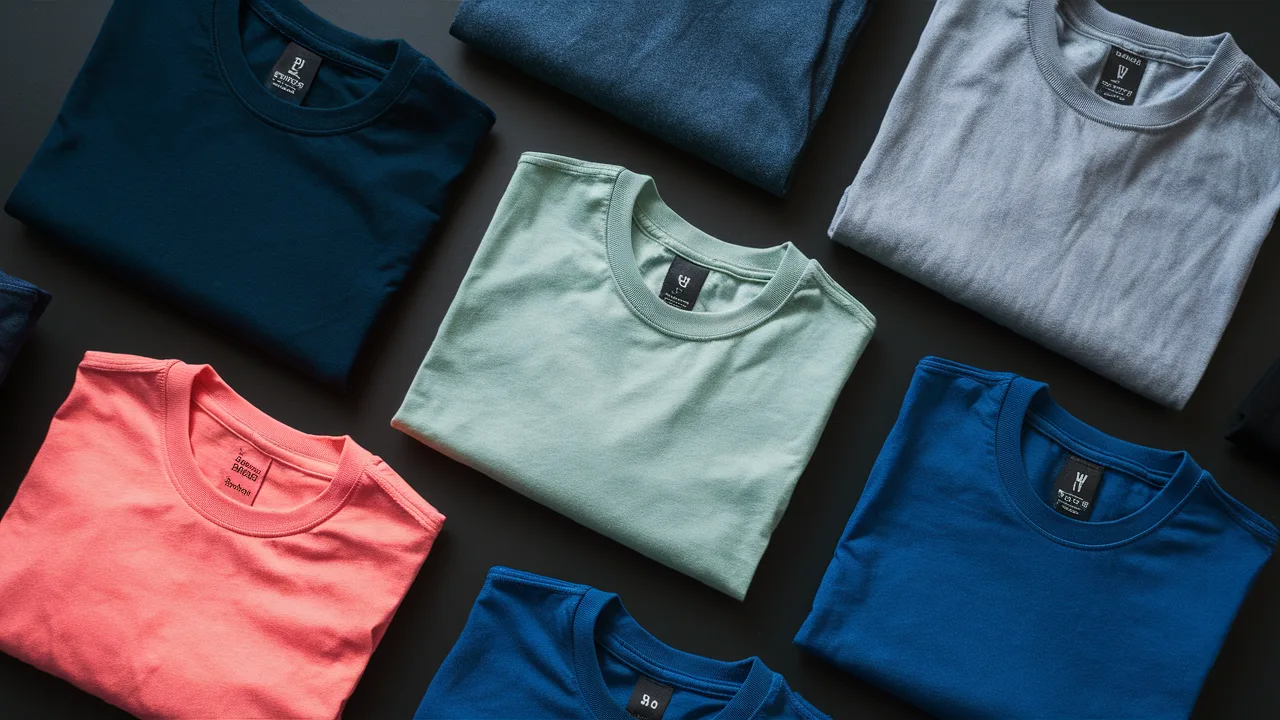What’s the Best T-Shirt Fabric for Custom Printing?
Choosing the right t-shirt fabric for t-shirt printing in Singapore can make or break your custom apparel project. The perfect fabric delivers comfort, showcases your design beautifully, and withstands countless washes. But with so many options available, how do you select the best t-shirt fabric for your needs? The answer depends on your priorities — whether you value comfort, visual impact, durability, or finding the sweet spot between all three.
TL;DR – Summary
- Cotton: Best fabric for softness, breathability, and natural comfort. Perfect for everyday wear and eco-conscious brands.
- Polyester: Most durable option with excellent wrinkle-resistance and vibrant printing results. Ideal for sportswear and promotional items.
- Linen: Premium lightweight fabric that’s incredibly breathable. Perfect for upscale collections and summer wear.
- For custom t-shirts, cotton-polyester blends (60/40 ratio) provide the optimal balance of comfort and performance.
- Printing considerations: Cotton excels with screen printing and DTG; polyester shines with sublimation printing.
- Budget range: Cotton offers affordable to mid-range pricing, polyester stays consistently mid-range, while linen commands premium prices.
Types of T-Shirt Fabrics
Understanding different t-shirt fabric options is essential when creating custom apparel or building your clothing line. Each fabric type offers unique characteristics that affect comfort, appearance, and printing results.
Cotton

Cotton remains the gold standard for t-shirt fabric — naturally soft, highly breathable, and hypoallergenic. Ring-spun cotton varieties offer superior smoothness and enhanced durability compared to regular cotton, while combed cotton provides an ultra-refined feel. Organic cotton adds eco-friendly appeal for sustainable brands.
- Comfort level: Excellent — highly breathable and gentle on skin
- Printing compatibility: Outstanding for DTG and screen printing
- Considerations: May shrink without pre-treatment; colors can fade over time
Polyester
This synthetic t-shirt fabric excels in durability and print clarity. Widely used in performance shirts and activewear, polyester effectively wicks moisture and resists wrinkles, making it ideal for busy lifestyles.
- Comfort level: Good — smooth texture with less breathability than cotton
- Printing compatibility: Exceptional for sublimation printing with ultra-vibrant, permanent colors
- Considerations: Less natural feel, tends to retain odors longer than cotton
Linen
Crafted from flax fibers, linen fabric offers a sophisticated texture and exceptional breathability. This premium option works beautifully for upscale custom t-shirts and summer collections.
- Comfort level: Excellent — exceptionally cool and lightweight
- Printing compatibility: Best suited for minimalist designs and vintage-style prints
- Considerations: Wrinkles easily, higher cost point
Fabric Comparison: Polyester vs. Cotton vs. Linen
This detailed comparison helps you visualize how different t-shirt fabrics perform across key factors.
| Fabric | Breathability | Print Quality | Durability | Feel | Care |
|---|---|---|---|---|---|
| Cotton | Excellent | Very Good | Good | Soft and Natural | Easy (cold water wash) |
| Polyester | Moderate | Excellent with Sublimation | Very High | Slick and Synthetic | Very Easy |
| Linen | Excellent | Good (light prints) | Moderate | Crisp and Textured | Hand wash recommended |
Essential Factors for Choosing the Best T-Shirt Fabric
Selecting the right fabric for custom t-shirts requires considering multiple factors beyond just how the material feels. Here are the critical aspects you should evaluate:
1. Intended Use and Target Market
Consider your t-shirt’s purpose: Will it be worn daily, used for corporate branding, designed for fitness activities, or created for beachwear? Athletic apparel typically benefits from polyester’s moisture-wicking properties, while comfort-focused brands should prioritize combed cotton.
2. Printing Method Compatibility

Different t-shirt fabrics respond uniquely to various printing techniques. Cotton fabric delivers bold, rich colors with DTG and screen printing methods, while polyester fabric excels with dye-sublimation for incredibly vibrant results. Linen works best with subtle prints that complement its natural aesthetic.
3. Budget Considerations and Profit Margins
Understanding fabric costs is crucial for your business success, especially when ordering in bulk quantities. Here’s the pricing breakdown for Singapore:
Cost Guide: Fabric Price Ranges in Singapore
| Fabric | Low-End | Mid-Range | High-End |
|---|---|---|---|
| Cotton | $4 – $6/pc | $7 – $11/pc | $12 – $18/pc |
| Polyester | $5 – $7/pc | $8 – $10/pc | $11 – $15/pc |
| Linen | $10 – $13/pc | $14 – $18/pc | $19 – $25/pc |
Expert Printing Tips for Different T-Shirt Fabrics
Each t-shirt fabric requires specific printing approaches to achieve optimal results. Here’s how to maximize your design quality based on fabric choice:
- Cotton fabric: Use water-based inks for a soft hand feel or plastisol inks for vibrant colors. Always pre-treat cotton before DTG printing for best adhesion.
- Polyester fabric: Dye-sublimation produces the most stunning results. Avoid excessive heat on lower-quality synthetics to prevent scorching.
- Linen fabric: Opt for minimal, monochrome designs to achieve elegant vintage aesthetics. Hand-printing or traditional screen printing works best.
Pro Tip: When working with fabric blends like 60/40 cotton-polyester, always run test prints first. Results can vary significantly depending on your ink selection and printing technique combination.
Frequently Asked Questions
1. What is the most durable t-shirt fabric?
Polyester offers exceptional durability — it resists stretching, shrinking, and fading, making it ideal for all-weather usage.
2. Which fabric is best for soft custom t-shirts?
Combed or ring-spun cotton is your go-to for luxurious, soft-to-touch tees that feel fantastic against the skin.
3. Is linen good for printed t-shirts?
It can be, especially for subtle, earth-tone, or minimalist prints. Linen adds texture but limits printing vibrancy.
4. Can polyester t-shirts feel soft?
Yes, many modern poly-blends are engineered for softness while retaining poly’s durability edge.
5. Does cotton always shrink?
Not always — pre-shrunk or treated cotton minimizes this risk. Always check the fabric treatment first.
6. Which fabric is better for hot weather?
Linen and light cottons are breathable and excel in hot climates, making them perfect for tropical wear.
7. What’s the easiest t-shirt fabric to print on?
Cotton is the most user-friendly for both screen and DTG printing. It holds ink well and looks crisp.
Final Thought
Selecting the best t-shirt fabric goes beyond choosing what feels nice — it’s about aligning your brand vision, customer expectations, and comfort preferences with fabric performance. Whether you’re launching your first batch of custom t-shirts or expanding your apparel line, consider printing compatibility, climate conditions, target audience, and budget constraints. While there’s no universal solution, there’s definitely a perfect match for your specific goals. When you find that ideal fabric, your t-shirts won’t just look professional — they’ll feel like they were crafted specifically for your customers.
